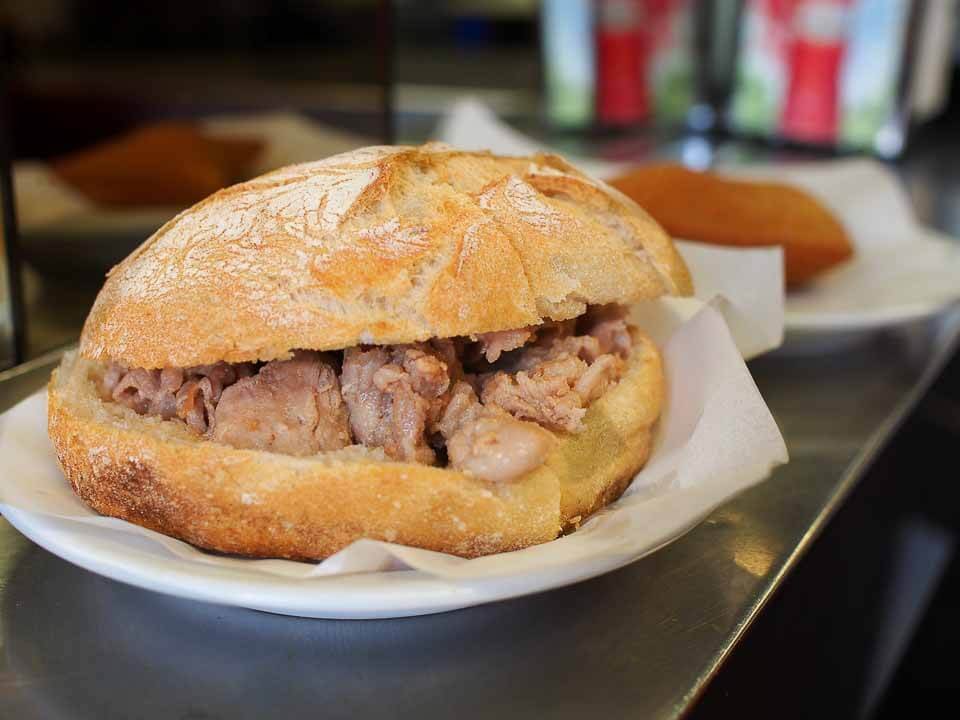The Food of Portugal: A Complete Guide To Food Tours and Eating Like a Local
With its richness in traditional cuisine and the growing food-related trends, Portugal is quickly becoming one of the hottest culinary tourism destinations in the world.
What’s more, for slow travelers, experiencing the food of Portugal will bring you steps closer to connecting with Portuguese people and culture on a whole new level.
And what better way to enjoy life than eating some of the most delicious food while also making new friends?
The Portuguese Food Experience
Long a favorite destination for slow travelers and food and wine lovers, Portugal is ever-evolving and home to countless mouthwatering dishes.
Because of its privileged coastal locale, the Portuguese food culture is incredibly influenced by the Atlantic Ocean.
This, combined with the optimal weather conditions, results in opulent seafood dishes slathered in high-quality olive oil with a side of highly nutritional greens.
And, of course, there’s Portugal’s signature bacalhau and soups to savor.
If you are on the lookout for the ultimate sensory food experience, read on to discover some of this amazing country’s treasures.
This article may contain affiliate links. If you click through and make a qualifying purchase, we may earn a small commission at no additional cost to you.
9 Portuguese Dishes You Shouldn’t Miss
Wandering the streets of Portugal is a 360-degree experience. The country never ceases to amaze with its overwhelming architectural and natural beauty, enchanting street music, and lively atmosphere.
Top that with one of the oldest culinary cultures in Europe — its first recipe book dates back to the 16th century — and you have a travel destination like no other.
On every corner, you’ll find traditional Portuguese tascas (taverns) offering all kinds of delicious foods. Here, we’ve highlighted nine traditional Portuguese specialties you shouldn’t miss in a sea of virtually infinite options.
Cozido Á Portuguesa
Despite its intense sun, Portugal’s temperatures can drop during wintertime. For this reason, the country has long been home to some of the most hearty and comforting soups.
Among these, we find the ever-famous Cozido à Portuguesa—the traditional Portuguese stew.
There are a few different variations on this classic dish. Notwithstanding, it usually consists of sausages and other meats boiled in vegetable stock and fresh vegetables.
From North to South, the typical Portuguese dish can feature farinheiras and morcela (two different types of sausages) or chicken.
Francesinha
No matter where you are in Portugal, you are bound to come across signs advertising francesinhas, a local culinary gem.
Originally from Porto, this beloved sandwich can be made of different types of meats, melted cheese, and spicy tomato sauce.
An affordable yet nutritious meal, francesinha is inspired by the French Croque Monsieur. Many establishments will usually offer the optional egg on top for extra wholesomeness.
Posta Mirandesa
Portuguese cuisine has long been influenced by its proximity with the rest of Europe and Posta Mirandesa is a delicious example of that.
Similar to the traditional Italian steak Bistecca Fiorentina you’d find in Tuscany, this Portuguese dish is typically made from the Tras-o-montes native Mirandesa calves, a DOC breed protected by the European Union itself.
This grilled steak is usually served with assorted greens and baked potatoes.
Bacalhau
Whether you live in Portugal or are just visiting, chances are you have heard of bacalhau.
The Portuguese love this northern fish so much that it is part of their national identity. They even boast that there are at least 365 ways to prepare bacalhau in Portugal—one for every day of the year.
The versatile codfish can be grilled, baked, fried, or even canned. When grilled (or á bras) bacalhau is tossed together with potatoes, eggs, olives, and garlic.
Definitely a must-try dish in Portugal!
Feijoada
A favorite among locals, feijoada is a bean-based stew mixed with beef, pork, or seafood.
Originally from the region of Tras-os-montes, this nutritious and comforting dish has made its way well into the Capital and even across the sea to Brazil.
Despite its simplicity, this dish has a characteristic flavor thanks to enhancing spices such as garlic, cloves, and paprika.
Sardinhas Asadas
Sardinhas Asadas is a favorite dish available all year round, although best enjoyed between June and September, when Lisbon hosts Santo António, a festival specifically dedicated to this delicacy.
St Anthony (Santo Antonio), often revered as the true patron saint of Lisbon, gives his name to this June event, which combines religious celebration with extensive amounts of non-religious events and a lot of sardines.
Grilled sardines, on the barbecue of course, with bell peppers, is one of the most typical dishes of this festival.
Nevertheless, you can still order a plate of sardinhas asadas throughout the year.
The fish are often served fresh off the grill with a side of greens, potatoes, or rice — all generously slathered in olive oil.
Caldo Verde
Another iconic Portuguese dish, Caldo Verde (literally translated into green soup), is originally from the northern side of the country yet consumed countrywide.
It consists of pureed potatoes mixed with a particular type of dark green cabbage grown in Portugal, similar to collard greens or kale.
Available in virtually every traditional restaurant, Caldo Verde is possibly the most affordable and delicious dish in the country.
Bonus points as its simple recipe mean you can easily make your own at home.
Bifanas
With the many sandwich options available countrywide, Portugal makes sure you never miss fast food.
Bifanas consist of marinated thin pork slices in fresh bread to be enjoyed by itself or served with an order of French fries and soup.
It’s a popular lunch menu option in Portugal, and the sandwich can sometimes be customized by adding egg or lettuce for extra crunchiness.
Bifanas can also be ordered without the pão (or bread) if you’d rather skip those extra carbs.
Polvo à la Lagareiro
You can’t possibly talk about Portuguese cuisine without mentioning octopus. For centuries, polvo has been a signature dish across the country.
A simple yet delicious recipe, Polvo a la Lagareiro consists of baked and roasted octopus and potatoes slathered in olive oil and complemented with herbs and garlic for a wholesome and unique flavor.
Indulging Your Sweet Tooth in Portugal
We wouldn’t be doing Portugal justice if we didn’t mention the country’s mouthwatering dessert selection.
At the end of a meal, for breakfast or mid-afternoon snack, Portugal offers virtually infinite opportunities for you to indulge in some heart-warming sweetness.
Though they come in many different shapes and flavors, Portuguese baked goods reflect the country’s love for rich and creamy treats.
Most pastry recipes go back to the 16th century when monastery nuns were believed to deal with a surplus of egg yolks that inspired their baking. So let’s dive in and discover some of the most appreciated Portuguese desserts:
Pasteis de Nata
Pasteis De Nata
Perhaps THE signature Portuguese dessert, Pasteis de Nata are the famous custard puffs and a national treasure.
Best served with coffee, these treats are available countrywide, though they originated from the Belem district of Lisbon.
Walking around the city in the early morning or mid-afternoon, you are very likely to observe locals enjoying their pasteis still warm with a sprinkle of cinnamon on top.
Queijada
Another treasure from the Lisbon area (Sintra) are queijadas, sweet, crunchy cheese pastries with a soft center. They are often sprinkled in powdered sugar and among the best pick-me-up treats in Portugal.
Much like pasteis de nata, queijadas can be enjoyed with your coffee in the morning or as an afternoon snack.
Bolas de Berlim, a popular sweet treat in Portugal
Bolas de Berlim
If you are into decadent desserts, you won’t remain indifferent to the wholesome creaminess of the Bolas de Berlim, the Berliner donuts of Portugal.
Filled with yellow creme pasteleiro (pastry cream), these pastries were brought to Portugal by German refugees during WWII and — to this day — still maintain the original sugary puffiness of the original German doughnut recipe.
Although often served hot, Bolas de Berlim is a summer hit sold at the beach.
Pudim de Ovos
Pudim de Ovos, or egg pudding, is a Portuguese take on the traditional French recipe.
Available at most stores and bakeries across the country, this dessert is also one the locals enjoy making at home.
Because of its high egg and sugar content, this Portuguese treat tends to lean a bit over the heavier side compared to its international counterparts but is delicious nonetheless.
Leite Creme
Yet another tribute to creaminess, Leite Creme (literally creamed milk) is easy to mistake for its French counterpart, crème brûlée. They share a similar consistency and sweetness, though their preparation differs.
Crème brûlée is usually baked, whereas leite creme is cooked on the stove.
Unmissable Culinary Experiences in Portugal
Food is such an essential part of Portuguese culture that we could go as far as saying you haven’t experienced the country to the fullest if you haven’t taken advantage of the abundance of delicacies it has to offer.
And not just that. Tuning in to the culinary habits of the locals can help you understand their way of living.
This is because sharing food has a social and ritualistic aspect that helps bring families and friends together.
In recent years, Portugal has even seen an increase in food movements and culinary trends to preserve locally sourced food, maintain ethical sourcing, and prevent waste.
Below, we have highlighted a few for you to choose from.
Slow Food Portugal
The Slow Food organization has to be on the top of the list as an international grassroots organization focused on the food movement.
A strong believer in food as a force interconnected with other aspects of life, the organization works towards changing the world by making socially and environmentally responsible food-related choices while also enjoying your meal.
As clearly implied in its name, the movement aims at balancing out the effects fast food has on both the environment and global culture.
Several restaurants have joined an increasingly popular slow food movement in Lisbon and the rest of the country.
Along with delivering the most sensational culinary experiences Portugal has to offer, these establishments are committed to letting you build meaningful human connections through the simple act of sharing food.
The Equal Food Co.
Located in Porto and Lisbon is one example of the alternative food scene constantly growing within Portugal.
The Equal Food Co. is all about imperfections. The company sources imperfect produce and surplus from Portuguese farmers and sells them at prices usually 40% lower than the grocery stores.
Taste of Lisboa
If you are here, chances are you are willing to experience Portugal in all its wonders, and what better way than to connect with your fellow foodies under the expert guidance of locals?
Taste of Lisboa helps you immerse in Portuguese culture through unique gastronomy, culinary experiences, and cooking classes alike. Their aim is for you to return to these beautiful neighborhoods with knowledge and confidence.
Taste Porto
Out and about in Porto and feeling peckish? Taste Porto, the oldest food tour company in town, offers exciting culinary tours of the city.
For first-timers to the city, it’s a great introduction to the local cuisine.
The company caters to locals and visitors with enticing food walks, cooking classes, and vintage food tours.
If you’re looking for an incredible culinary experience at your own pace, Taste Porto also offers their popular Food Passport, a self-guided food tour available in seven languages!
If you’re a foodie looking to discover some of the foods at the heart of the Mediterranean, maybe Portugal should be next on your list. The food scene alone has so much to offer food and wine lovers. As the country draws more and more foreign visitors, these unforgettable food experiences across the country are bound to become even more popular.
Now is the time for Portugal. Go, now!









